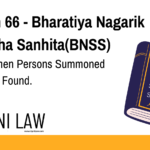Code: Section 63 BNSS
Every summons issued by a Court under this Sanhita shall be,—
(i) in writing, in duplicate, signed by the presiding officer of such Court or by
such other officer as the High Court may, from time to time, by rule direct, and shall
bear the seal of the Court; or
(ii) in an encrypted or any other form of electronic communication and shall
bear the image of the seal of the Court or digital signature.
Explanation of Section 63 BNSS
Key Provisions
- Format of a Summons
- A summons must be in writing and issued in duplicate.
- It must be signed by an authorized judicial officer.
- Authentication of a Summons
- If issued physically, it must have the Court’s official seal.
- If issued electronically, it must contain a digital signature or seal image to verify authenticity.
- Authorization of Officers
- High Courts have the authority to designate specific officers to sign summons under their jurisdiction.
Illustration of Section 63 BNSS
Example 1: Issuance of a Physical Summons
Case: A Criminal Court in Delhi issues a summons for Mr. X to appear in a theft case.
✅ The Magistrate signs the summons, and it bears the official Court seal.
✅ The duplicate copy is sent to the police for delivery.
Example 2: Issuance of an Electronic Summons
Case: A Civil Court in Mumbai sends a summons to Mr. Y via email.
✅ The summons is encrypted, includes the digital signature of the Judge, and has a Court seal image.
✅ This is a valid mode of service under Section 63 BNSS.
Example 3: High Court Rule on Summons
Case: The High Court of Karnataka issues a rule allowing registrars to sign summons.
✅ A registrar, following this rule, signs a summons for a case.
✅ The summons remains legally valid under Section 63 BNSS.
Common Questions and Answers on Section 63 BNSS
1. Who can sign a summons?
✅ The presiding officer of the Court or any other officer authorized by the High Court.
2. Can a summons be issued electronically?
✅ Yes, it can be encrypted or in digital format, provided it has a Court seal image or digital signature.
3. What makes a physical summons valid?
✅ It must be in writing, in duplicate, signed, and bear the Court’s seal.
4. Can the High Court delegate the power to sign summons?
✅ Yes, the High Court can authorize specific officers to issue summons through its rules.
5. What happens if a summons lacks a seal or signature?
❌ It may be considered invalid and could be challenged in Court.
Conclusion
Section 63 BNSS ensures that summonses are legally authenticated by:
✅ Requiring proper signatures and Court seals.
✅ Allowing electronic summons for faster delivery.
✅ Granting High Courts authority to define who can sign summons.
For more legal updates, visit ApniLaw! 🚀







